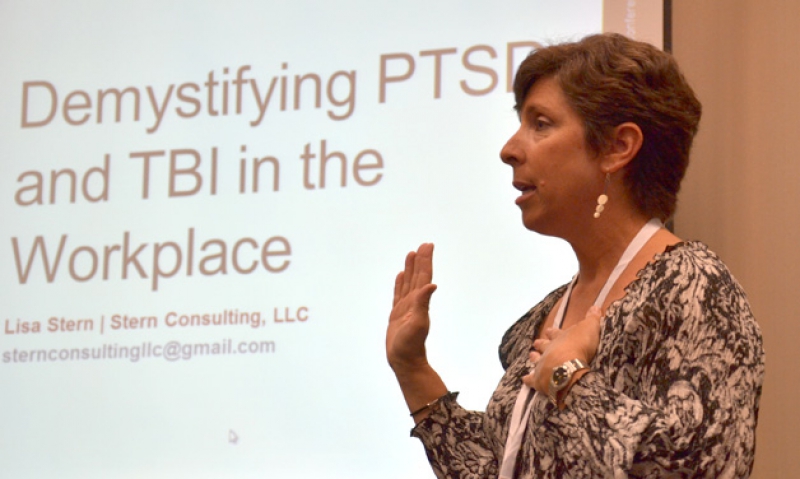
VA for Vets attendees in Detroit receive education on "Demystifying Traumatic Brain Injury and Post-traumatic Stress Disorder in the Workplace."
Lisa Stern said her biggest regret in life is not having served in the military. However, as a self-employed workforce development specialist in Washington, D.C., she is giving back to those who have served by supporting the employment of veterans.
Stern has nearly 30 years of experience in disability employment and in 2000, while working for the MontgomeryWorks One-Stop Job Center in Maryland, she received a Veterans Workforce Investment Program grant that changed her job path.
The grant "was absolutely life changing," Stern said. "I worked with veterans with very significant barriers to employment and found ways, working with one veteran at a time, to eliminate the barriers. But, I quit (MontgomeryWorks) about three years ago because I decided that I, without a doubt, had found my passion. Now, I live and breathe, eat and sleep veterans’ issues."
Stern conducts educational sessions called "Demystifying Traumatic Brain Injury (TBI) and Post-traumatic Stress Disorder (PTSD) in the Workplace." She gave a presentation on the topic Wednesday — PTSD Awareness Day — at the VA for Vets event in Detroit.
She began her hour-long session by pointing out that psychological trauma and physical injury to the brain – both treatable and curable – are not uncommon. Between 50 and 60 percent of the general American population has been subjected to at least one psychological trauma in his or her lifetime, Stern said. Anyone who has had a simple concussion such as a sports injury has, by definition, experienced traumatic brain injury, she said.
"PTSD and TBI are hardly exclusive to the military and veteran population," Stern said, "nor are the reactions to them." Stern reminded her audience that we all have headaches, startle responses, mood swings, periods of depression, anger outbursts, episodes of fatigue and lapses of memory – the common symptoms of PTSD and TBI. The difference is, she explains, those who live with, "not suffer," the conditions experience their symptoms more frequently and, perhaps, more profoundly than others. Even so, Stern said the symptoms of PTSD and TBI have been highly exaggerated or even sensationally fictionalized by popular media, thus precipitating a wholly unearned stigma. For instance, she said the common employer fear that a veteran with PTSD or TBI is more likely to commit an act of violence is largely unfounded. In fact, according to Stern, such a veteran is more likely to be the victim of violence than a non-veteran co-worker.
Stern said that workplace accommodation for veterans — and others — with PTSD/TBI are basically intuitive. According to Stern, employers can:
-
Permit flex time to allow health-care appointments and other personal needs to be met.
-
Schedule frequent work breaks.
-
Provide additional time and training when introducing new tasks and routines.
-
Provide job-sharing opportunities.
-
Encourage list-making.
-
Assign mentors to help employees determine goals and provide daily guidance.
-
Provide written and verbal instructions.
"The rewards for employers, who wisely and rightly chose to accommodate veterans who live with PTSD and TBI, are great," Stern said. "Time and again, veterans have proven to outstrip their colleagues who have not served in dependability, dedication to duty, team building, reliability and all the other highly desirable attributes employers seek."
Additionally, Stern is a proponent of the "D" in PTSD. According to her, classing the condition as a disorder is necessary to recognizing it for what it is and directing appropriate treatment toward it. "The D is there for a reason," Stern said. "Because if evaluated correctly, that’s what separates maybe mild trauma or mild depression from something that is interfering with daily life. That’s why it’s in the DSM (Diagnostic and Statistical Manual of Mental Disorders), that is why there’s a category for it."
Meanwhile, at the end of her presentation during the VA for Vets event, Stern quoted Dr. Robert E. Drake:
"Given the choice between work and idleness, people will almost always choose work. Regardless of our station in life, the conditions of our bodies and minds or the amount of money in our bank accounts, the need to work remains one of our strongest drives. Work is central to our lives and, as such, gives a large measure of structure to our days. Common sense tells us that we feel better about ourselves when we are working regularly."
In other words, PTSD and those who live with it belong in the workplace.
Read more about VA for Vets hiring fair here.
- Careers

